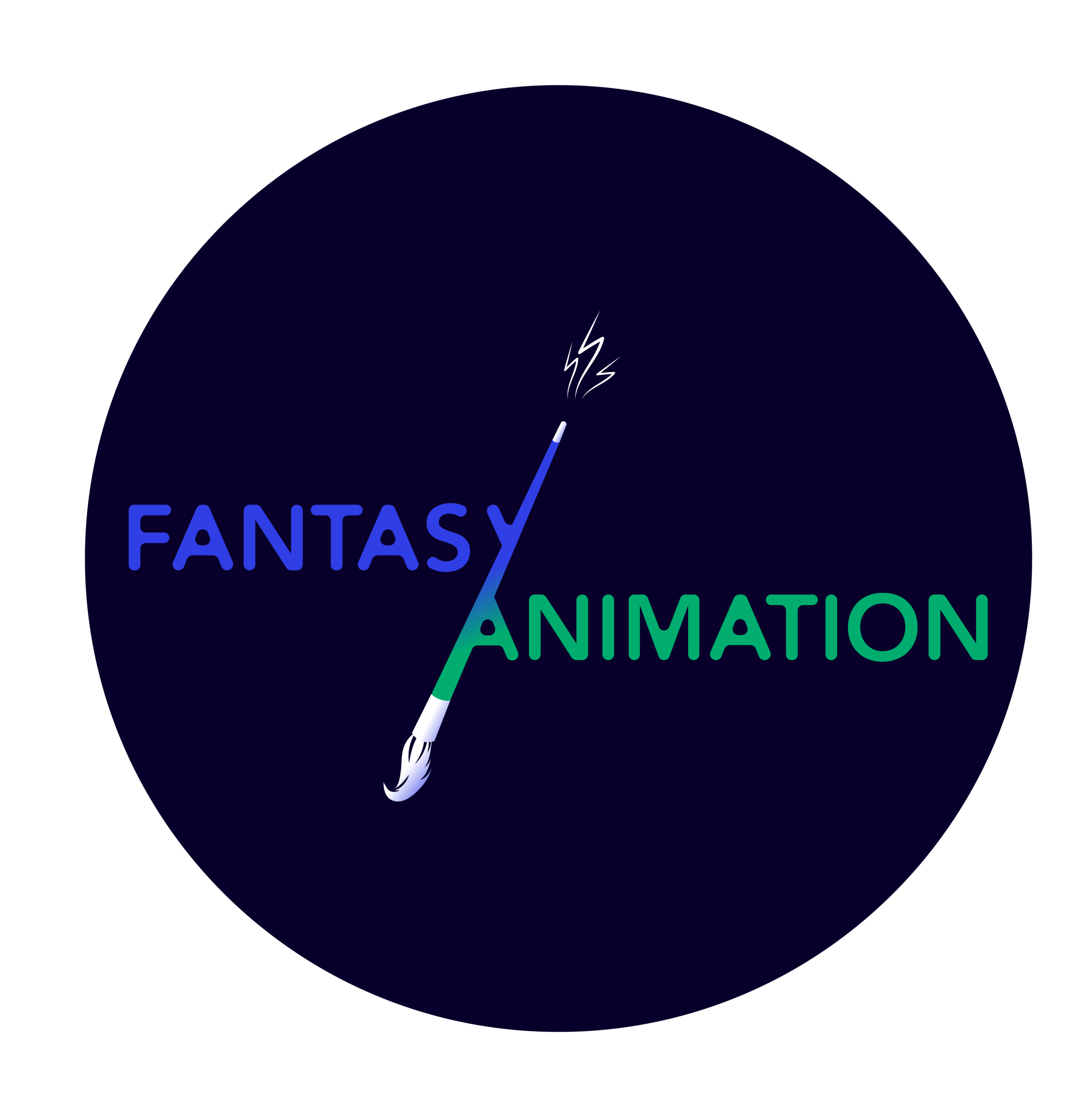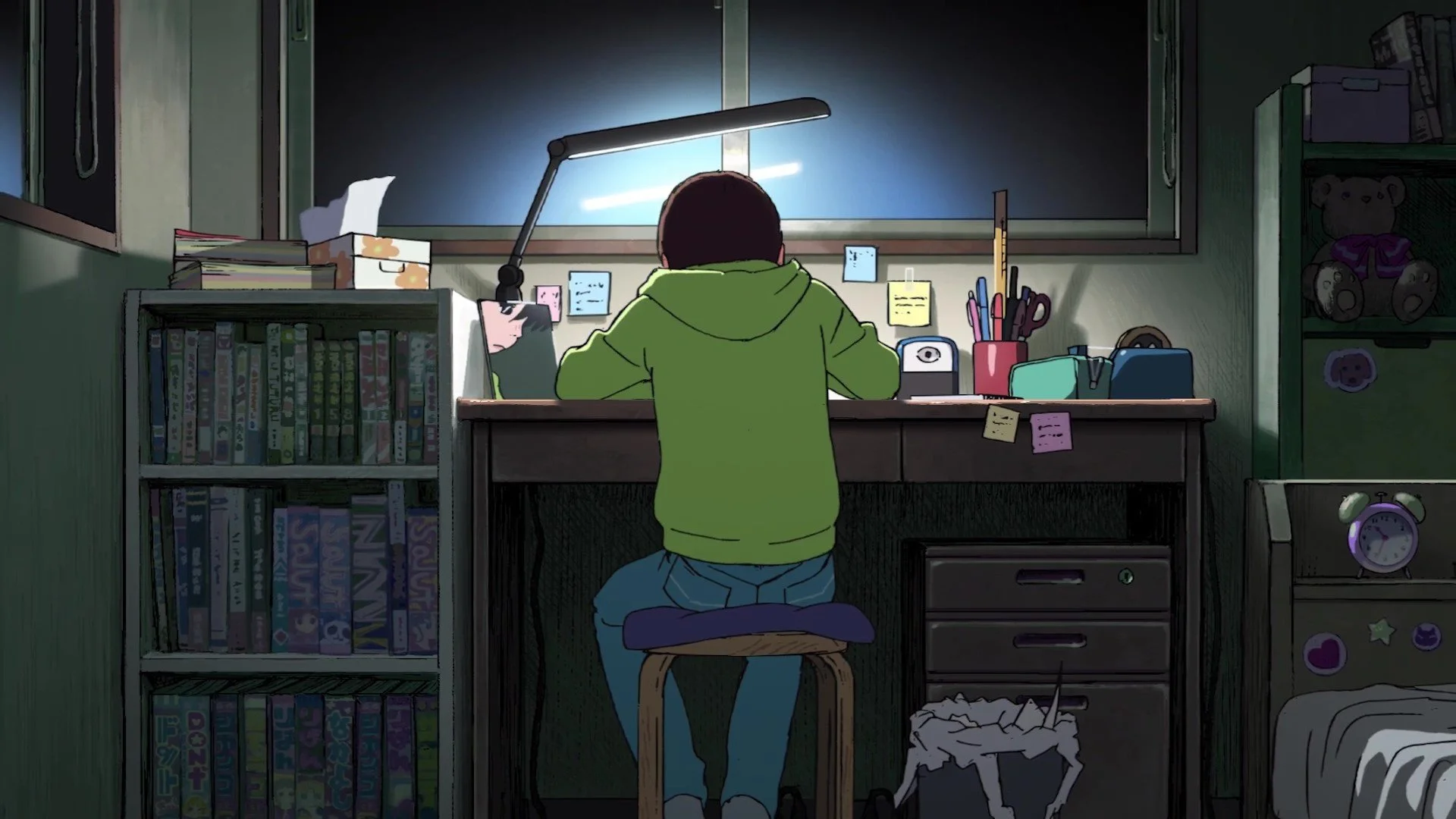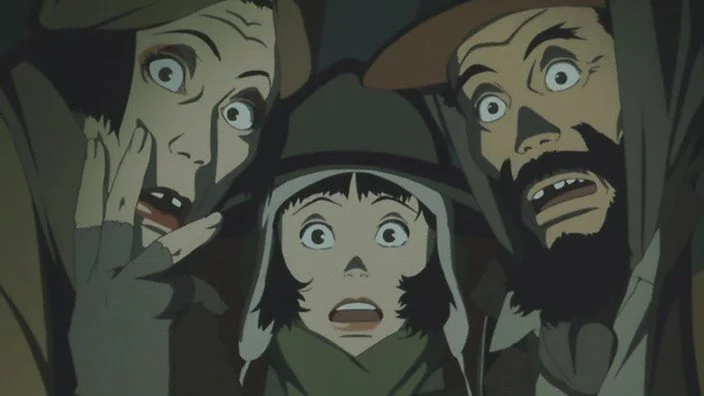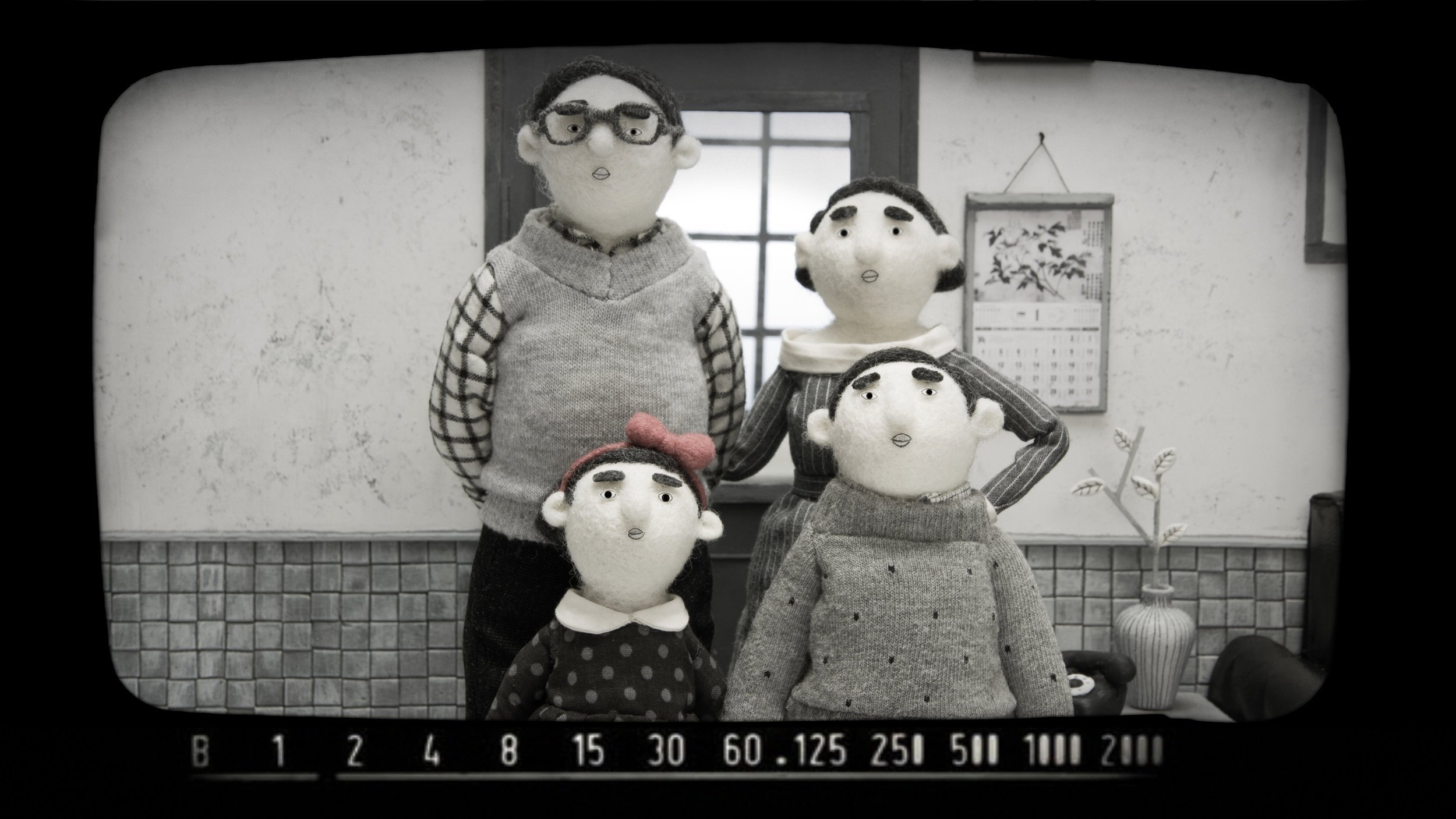Look Back (2024), directed by Kiyotaka Oshiyama and written by Tatsuki Fujimoto, explores the emotional struggles involved when maintaining artistic motivation, told through the story of protagonists Fujino and Kyomoto. Through an expressive use of animation sound, and colour, the film immerses viewers in a narrative that examines the complicated relationship that artists often have with creativity as they seek validation and self-worth. This blog will analyse how Look Back, along with its manga counterpart, portrays the emotional complexities of creative ambition, burnout, and identity, while reflecting the internal conflicts many artists face when the passion in their art begins to waver.
Read MoreCommon notions about the homeless have been perpetuated through demeaning tropes that only fuel their ostracism from society. Almost every television programme or film has depicted homeless people before, often portraying them in a negative light, using them for comedic relief, or simply treating them as shallow background characters, without ever addressing their situation seriously. Japanese film director Satoshi Kon, however, shines a spotlight on the personal experiences of these people, who often come from different backgrounds, by making them the main characters in his animated feature film, Tokyo Godfathers (2003). Set in a snowy Tokyo at Christmas, the story follows Hana, a transgender woman and former drag queen, Gin, a middle-aged alcoholic, and Miyuki, a teenage runaway taken care of by Hana and Gin. While picking through trash, the three are interrupted by the cries of an abandoned baby. Not knowing of the parents’ whereabouts, Hana insists that they take care of this baby until they find them, to the dismay of Miyuki and Gin.
Read MoreThe historical context of the one-child policy, alongside personal anecdotes and experiences, make the stop motion film Sister (Siqi Song, 2018) emotionally impactful. The film’s unique story of presenting a life with his little sister to only take it away and show the life he experienced alone is symbolic of the life of being an older brother taken from him. Creator and director Siqi Song displays the life-altering effects of the one-child policy with details of her own personal experiences of and relationship to Chinese culture. Through historical commentary, she crafts a compelling experience that reflects the policy’s emotional impact on China and its population through the creative treatment of her culture.
Read MoreArcane, directed by Pascal Charrue, Arnaud Delord, and Bart Maunoury in 2024, is a tale of two sisters and their tumultuous relationship shaped by the neighbouring cities around them. Their choices influence the future of these cities, and the impact each has on the other is profound. However, there lies an alternate timeline where other aspects of the world are explored, and the audience gets a glimpse of what could have been. As this blog post shows, season two, episode seven of Arcane titled “Pretend Like It's the First Time,” contrasted with the series as a whole, portrays psychological disorders not as a flaw but a facet of character through the lens of narrative and colour using a girl named Powder.
Read MoreThe Tricky Women International Animated Film Festival, screening works by female and genderqueer artists, aspires to the fantastical vision, “to imagine a world that is different from the one we currently live in.” Given its radical agenda, it is remarkable that host city Vienna has consistently supported this event for twenty-five successive years in some of its finest cinemas, attended by diverse audiences and sponsored by prestigious patrons (Fig. 1). The strategic positioning of the festival to coincide with International Women’s Day welds it into feminist history. The ambition for transformation is proposed at both the organisational level, the shared director role broadening strategies for inclusion, and the programming, with films characterised by fantastical themes of transgression, mobilised most persistently through the figure of the monstrous female body.
Read MoreIn the previous blog, I analyzed Stromae’s verse from the song Ma Meilleure Ennemie as a reflection of Ekko’s emotional struggle in the animated series Arcane. This part is about Pomme’s verse and how it can be interpreted as a representation of Jinx’s inner guilt. Pomme has a softer voice that contrasts with the chaotic atmosphere that Jinx is often associated with. I will explore how both the lyrics and the visuals of the music video reflect Jinx’s fractured sense of self, emotional paralysis and duality between desiring connection and fearing it at the same time.
Read MoreThis is the first of two blogs that focus on music as narrative in the animated series Arcane (Christian Linke & Alex Yee, 2021-) supported by an analysis of its animation and character development. The series is set within the League of Legends (2009-) universe, an online multiplayer videogame created by Riot Games. It takes place in various fictional lands populated by hundreds of different champions, some of whom are explored in Arcane.
Read MoreYou’ve seen this all before. A character, often male, is a nice guy, maybe a bit too nice or too repressed. They’re nerdy or meek, not overly popular, and often bullied or abused in some way. However, in certain situations, everything changes. Either through a shift in mannerisms or through an actual physical transformation, they change into a violent brute, a self-confident schemer, or a passionate womaniser. Characters like The Incredible Hulk, Yami Yugi and Yami Bakura from Japanese manga series Yu-Gi-Oh! (Kazuki Takahashi, 1996-), and all versions of The Nutty Professor story. Popularised by the fantasy of Dr Jekyll and Mister Hyde, and later by pulp entertainment drawing from limited understandings of the then-named Multiple Personality Disorder in the early 20th century, the dramatised conception of people with aggressive alternate personalities appear across a diverse range of animation in both heroic and villainous roles, but few name what it is or give the topic proper weight.
Read MoreExperimental animation often employs metamorphosis and incorporates visual metaphors as strategies to explore concepts such as the cycle of historical trauma, thereby contributing to the transmission of collective memories related to colonialism, apartheid, and war. (Stewart 2024, 7). These transformations not only signify external historical ruptures but also mirror internal emotional upheavals. In this context, the body emerges as a crucial site of expression, metaphorically becoming a space through which the intensity of emotion can be measured (Kövecses 2000, 24). This provides a solid theoretical basis for using the body to express abstract traumatic emotions in experimental animation.
Read MoreAnimation is inherently queer. The very process of destabilising the rigid boundaries of the human body and abstracting it into shapes and colours that we can project ourselves onto is essentially a process of queering. In their article “Why Are Cartoons So Queer?” for Sunstroke Magazine, Kellie Toyama remarks that “the flexible nature of animation gives stories the added potential to introduce fluid concepts of gender and sexuality with ease,” making animation the perfect medium to visualise the queer experience. As Paul Wells states, “the animated film has the capacity to redefine orthodoxies of live-action narrative and images,” an analysis that Kodi Maier elaborates on by linking his discussion directly to queer theory: “animation’s elasticity opens a realm where ideas of normalcy are disrupted and hidden potentials are revealed much in the same way that queer theory disrupts common understandings of gender and sexuality to explore other options in regards to embodiment and expression.” Why is it, then, that mainstream animation has for so long been afraid of queerness?
Read MoreCoal Black and de Sebben Dwarfs was one of the earliest animated American films to place a Black woman as the main character. Directed by Bob Clampett at Warner Brothers in 1942, the character of So White set a precedent for three further Black female lead characters in future Warner Brothers animated projects. However, introduced as a “happy washerwoman made for a jazzier version of the mammy stereotype” (Lehman 2007, 78), So White contributes to a larger structure of racism within American animation, hindering the progression of positive representation for future Black women as animated characters. The question that this blog investigates is whether the representation of Black women in Warner Brothers animation has truly improved since the introduction of So White, or do So White’s successors continue to perpetrate harmful stereotypes about African American women?
Read MoreWhen arthouse streaming service, MUBI, acquired one of the year’s surprisingly successful films, 6x Oscar-nominated The Substance (Coralie Fargeat, 2024), it was originally being distributed by Universal for barely $18M. However, French writer/director Coralie Fargeat’s refusal to cut certain scenes eventually allowed her to shop the film elsewhere. With Fargeat now satisfied and Universal likely banging their heads against the wall, The Substance has become an absolute hit, going on to make $70M+ at the global box office (D’Alessandro, 2024).
Read MoreIn recent years, the entertainment industry has begun to delve more deeply into the once taboo topic of mental health and its complexities, expanding the representation of characters with mental illness beyond the two-dimensional caricatures that such screen representations began with. Riot Games’ animated Netflix series Arcane (Christian Linke & Alex Yee, 2021-) stands out as a compelling addition to this discussion, particularly through its creative representation of one character’s increasing mental instability. In this blog, I will analyze how Arcane draws from real-life manifestations of psychosis in order to create a visceral illustrated experience through the psychological deterioration of the innocent Powder into her unstable new identity, Jinx.
Read MoreIn animation and film, disability representation is crucial in shaping the portrayal and perception of characters. A previous article took a closer look at Zatoichi the Blind Swordsman, and found that disability can either be a barrier or a defining characteristic that enhances a character’s depth and relatability to audiences. Such representations are often taken for granted, yet they carry significant symbolic and practical weight. This can be particularly evident in how vision disability is depicted through characters who wear glasses. Glasses worn by fictional characters serve as integral elements of character design, reflecting personality traits, intellectual abilities, and personal journeys.
Read MoreScott Pilgrim Takes Off (2023-) is an anime adaptation of the original graphic novel by Bryan Lee O’Malley and directed by Abel Góngora, released in November 2023. One of the many adaptations of the original story, Góngora’s retelling shifts its focus to its female lead, Ramona Flowers while featuring a new narrative of forgiveness and reconciliation with past relationships.
Read MoreThis blog post examines the 2017 film Liyana, directed by Aaron and Amanda Kopp, which describes itself as a “genre-defying documentary” that weaves together both animation and live-action scenes to tell the story of five orphaned children in the Kingdom of Eswatini. Yet its reflexive framing narrative focuses on the children’s creation of their own fictional tale featuring the fearless Liyana, who as part of the film’s story-within-a-story structure embarks on a treacherous quest to save her younger brothers.
Read MoreThis blog post about Undone (Amazon Prime, 2019-2022) functions as a coping mechanism in light of Undone’s cancellation after two seasons, but also sets out to shed light on fragmented selves and multiverses, tropes that have been particularly prevalent in recent women-centric US TV.
Read MoreTim Burton’s Bodies provides a distinctive body-centric approach to the analysis of Burton’s back-catalogue of animated and live-action films (see Fig. 1 for book cover). Tim Burton is an internationally celebrated filmmaker, animator and artist who has worked in the industry since the 1980s. His work is commercially and critically acclaimed and is mostly associated with the fantasy horror sub-genre, the macabre and spectral, animated corpses and grotesque outsider protagonists.
Read MoreJust a little over three and a half years into the 2020s, the seeds of the tropes and trends that future generations shall refer to as “2020's cinema” began to sprout. Be it the new string of self-aware whodunits following the success of Knives Out (Rian Johnson, 2019), such as Bodies, Bodies, Bodies and See How They Run (both released in 2022), or the slow resurgence of slashers with Scream sequels, X and Freaky (starting a new chapter for the genre after its self-referential era post-Scream and ‘neo-slasher’ period in the 2000’s), an exciting foundation for this new decade’s cinema has been set.
Read MoreIn the first act of Neil Jordan’s Breakfast on Pluto (2005), a tale of a young transgender woman growing up in small town Ireland during the height of the troubles in the 1970s, there is an extended fantasy sequence in which Kitten (Cillian Murphy) imagines her own conception by her parents. It is one of many fantasy sequences that are scattered throughout the film, and one that relies heavily on manifesting a fictional memory which most likely did not happen.
Read More



















